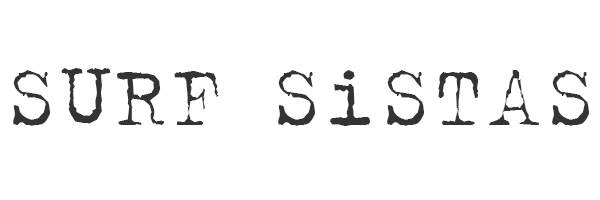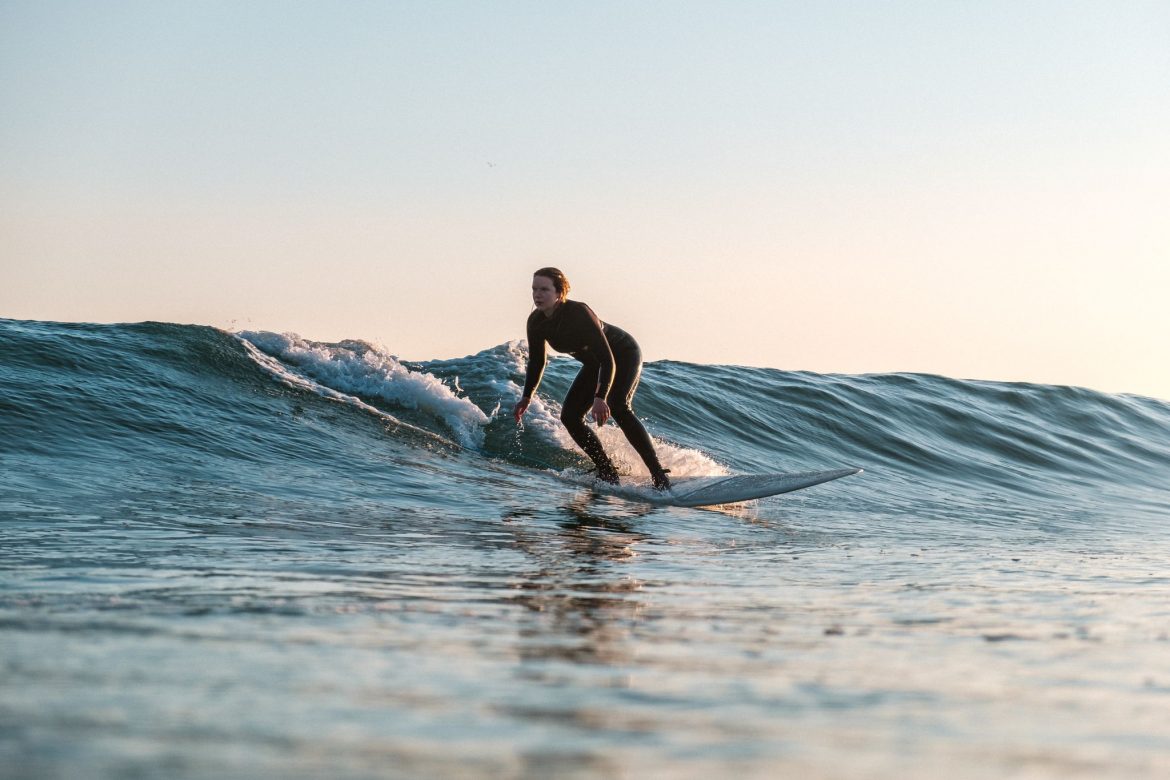Learning a new skill as an adult can feel like a bit of an uphill climb, especially something like surfing. We’re less agile than kids, teens and those in their early 20’s. Plus our reaction times slow down and our brain’s aren’t quite as sharp.
But that doesn’t mean that learning to surf in your 30’s is impossible. Or that you should have started in your teens or 20’s to get to a good level of surfing. And one of our surf instructors is actual proof of that!
We caught up with Surf Sistas coach Kirsty, who learnt to surf in her 30’s and smashed through several barriers along the way to becoming a qualified surf instructor! Over to you Kirsty!
It all started with a bucket list….
Growing up and living in the landlocked West Midlands I had zero exposure to the sea. My mum couldn’t swim and while I had lessons at school, I was never a strong swimmer. I pretty much hated sports at school, preferring dancing instead.
Up until the day of my first surf lesson, I’d never been in the sea. Like, not even for a splash around.
But something about surfing and the surf lifestyle appealed to me. So, during a holiday to Cornwall I added ‘learn to surf’ to my bucket list, just to say I’d done it.
I just didn’t realise at the time how much of an impact that lesson would make and that it would literally alter the course of the rest of my life. I hate sounding dramatic, but if I look back at how different my life looked before surfing, I still can’t believe how much life has changed since I started surfing.
My first surf lesson
So at age 33, I booked a lesson and tried to forget that I was actually scared of the sea. But when the day arrived, the instructors put me at ease so much and I was concentrating so hard on what to do that all those worries disappeared. And staying in waist high water and being able to touch the bottom meant I never felt out of my depth.
I still remember the first wave I caught, got to my feet and rode into the beach. It felt like flying and I was instantly hooked.
Becoming a landlocked surfer
Living in Wolverhampton in the UK isn’t exactly an ideal place for getting to the beach. So for 3 years after that surf lesson, I kind of forgot about surfing and figured it was something I might do occasionally on holiday.
Until a chance conversation with a friend one night who’d tried surfing once and wanted to do it again. He suggested going to North Devon. And while me and my husband figured we’d make a weekend of it, our friend suggested a day trip. We thought he was crazy, but the following weekend, he picked us up at 5.30am and drove 200 miles from our house to Croyde where we rented boards and wetsuits and had a brilliant time.
And that’s how I became a landlocked surfer. We did crazy day trips as often as we could and holidays in the UK centred around Cornwall and Devon. I had occasional refresher lessons and learnt to lower my expectations. Although I’d stood up on my first lesson, it took months of doing those day trips to be able to stand up on a board again.
With inconsistent opportunities to surf, progress was a lot slower and sometimes it felt like taking 1 step forward and 2 steps back again.
It was frustrating, but I did everything I could to help myself in between surf trips. Doing surf specific exercises in the gym, improving my general fitness and practising my pop-up on dry land.
And that was fine for a while, until the pull to be nearer to the sea and surf more often became so strong for both me and my husband that eventually it reached a tipping point.
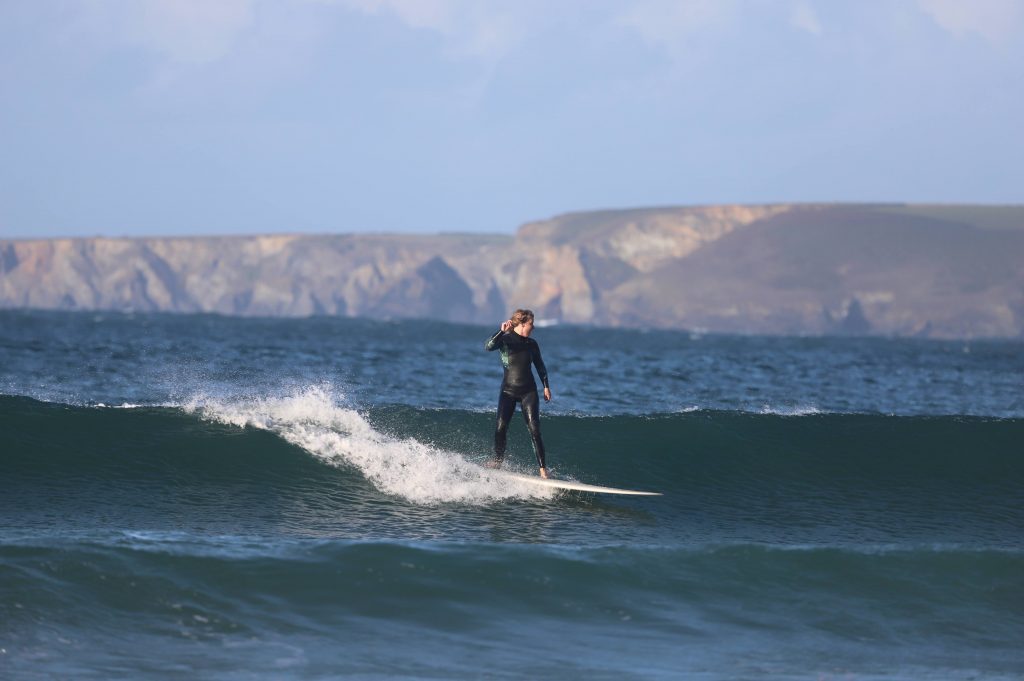
We love her laid back longboard style. Just cruising.
Moving to Cornwall
Disillusioned with city life, the 9-5 grind and feeling like we were in the rat race, we sold our house, packed up our lives and started over in Cornwall.
Within months I connected with other female surfers, joined a female only surf club and got in the water as often as I could. I’d picked up a few bad habits with my surfing that I wanted to iron out and I can still remember swallowing my pride and spending months in the whitewater re-learning my pop-up which was slowing me down when it came to surfing unbroken waves. It was one of the best pieces of advice that a surf coach gave me.
All that work paid off and once I felt confident that I’d broken the habit of going to my knees, I started surfing out back on small 1-2ft days and slowly going out when it was a bit bigger.
Goal setting and taking it too seriously
I’d seen a picture of someone surfing shoulder high waves and making it look so effortless so I set myself the goal of being able to do that consistently. I had to push myself outside my comfort zone but with some coaching along the way, improved fitness thanks to all the surfing which increased my confidence, I reached my goal. And then I immediately moved the goalposts and set myself more surf goals than I care to mention.
That’s when I started to take surfing way too seriously. I wanted to prove that I could be good at it, because we all want to be good at something, right? But why I decided I wanted to be ‘good’ at one of the hardest ‘sports’ to learn I’ll never know.
I guess at the end of the day, I love pushing myself outside my comfort zone.
But by taking it too seriously, I forgot how to have fun and while my surfing improved in some areas, I felt rigid and looked wooden in my stance because I wasn’t relaxed. I’d cry with frustration, threaten to give up surfing when a surf didn’t go my way and set my expectations way too high.
Then I watched a documentary on Stephanie Gilmore, 8 x women’s world champion. She’d always wanted to be the best surfer in the world but in the film, she ponders why and says ‘you don’t get super powers from being the best surfer in the world.’
And that really made me stop and think, and remind myself that I never got into surfing to get ‘good’ at it. I just wanted to feel that incredible feeling of riding waves and have fun along the way.
And what actually is ‘good’ anyway? When I stopped and thought about it, I realised everyone’s interpretation of being a good surfer differs. And besides, what does it even matter? It’s all about how it makes you feel and not a measure of success.
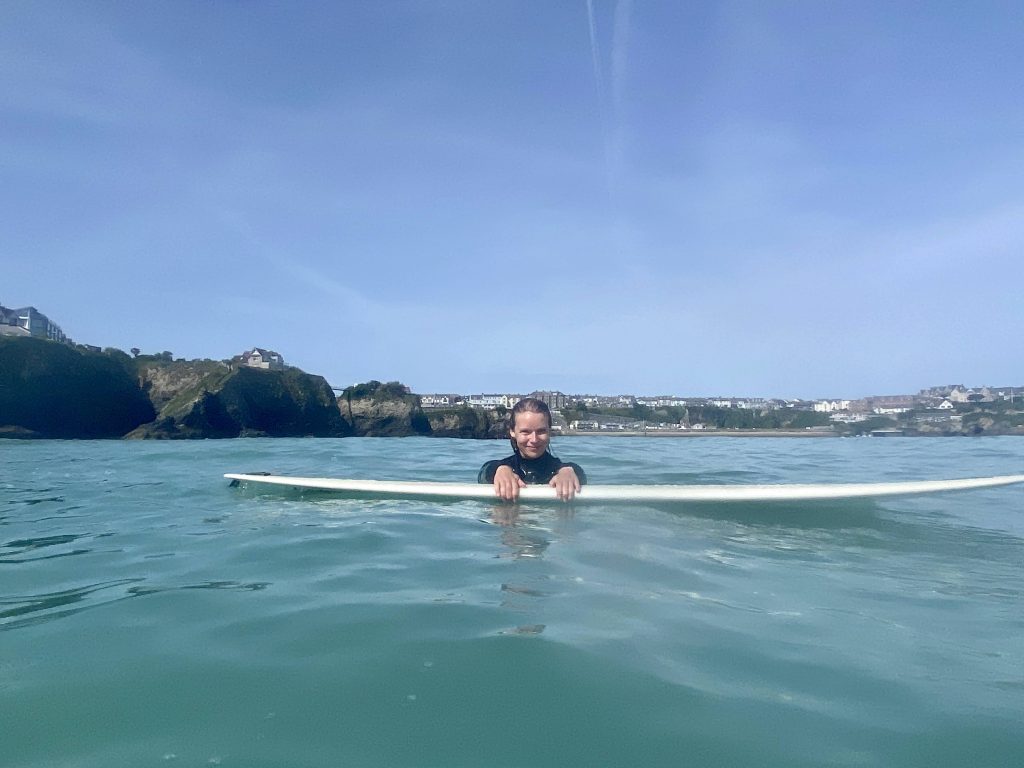
Kirsty finding calm in the sea
Finding peace
For a couple of years I had to really work on my mindset and as I let go of all those expectations and limiting beliefs, my surf stance loosened up, I started to relax and have fun again. And as a result, I found true peace with where I’m at with my surfing.
I don’t have to prove to anyone that I can surf and I no longer set unrealistic expectations. I don’t even set goals anymore. I surf purely to enjoy the feeling. I no longer give myself a hard time for not surfing (that was exhausting!) and if it’s too big for me, I’m no longer pushing myself to try and break past that next barrier.
I’m proud of what I’ve achieved, and if you’d told me in my 20’s that I’d become a surfer, I’d have laughed and wouldn’t have believed you!
Qualifying as a surf instructor
But there was one more thing that I wanted to achieve. I benefited so much from surf coaching and felt I had a lot to give, especially to other women who learn to surf in their 30s or later in life, or who are landlocked and can’t surf very often.
I wanted to share my experiences of learning to surf and overcoming some of the barriers I faced. So I decided to become a surf instructor.
There was only one tiny barrier that stood in my way. My swimming.
Remember me telling you that I was never a strong swimmer? No-one had ever taught me how to swim front crawl properly. I mean full head down, goggles on and breathing to the side. And for my qualification I needed to do a timed swim as part of my lifeguard qualification.
So I got some swim coaching and spent months in the pool, working on my technique and getting progressively quicker at reaching the time needed to pass the course.
And all that swim training has paid off in other ways. I now swim in the sea beyond the breaking waves without the comfort of a surfboard. It’s improved my sea and surf confidence, and I’ve discovered a love of swimming that I never thought I’d ever have.
Life really does begin at the end of your comfort zone and I’ve got surfing to thank for completely changing my life. I’ve gained so much from surfing – a new home, lifestyle, travels, new skills, friends, and a new career!
So if you’re sitting there thinking that you’re too old, not sporty enough, or you live too far away from the beach to be a surfer, I’m proof that age is completely irrelevant.
And if that’s not enough proof for you, just take a look at local Newquay surf legend Gwyn Haslock. When you find out how old she is, you’ll never see age as a barrier to surfing again!
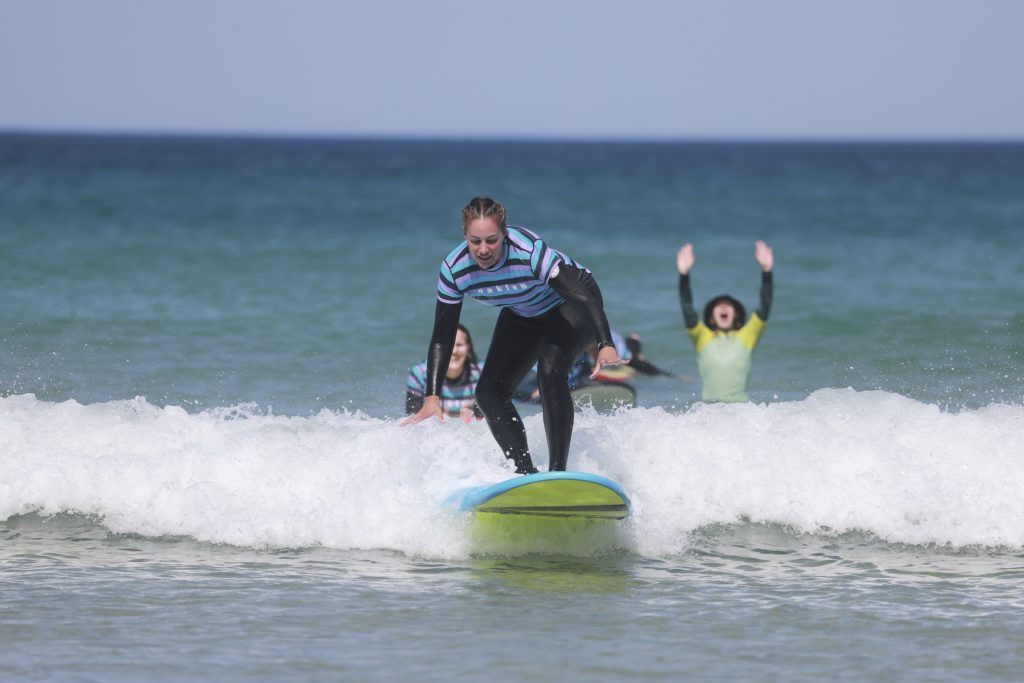
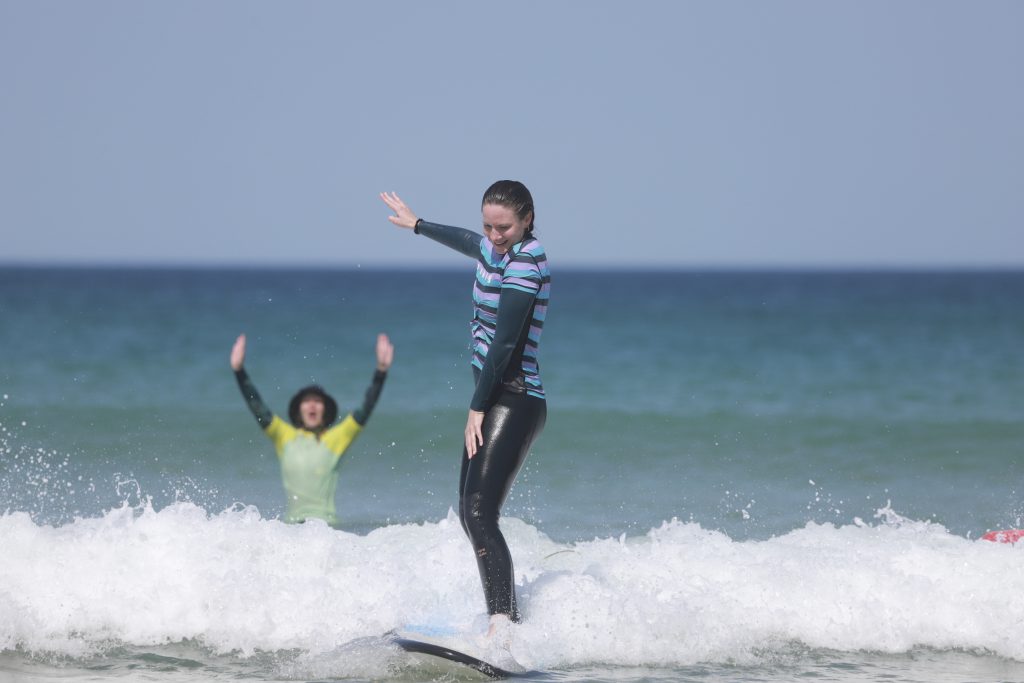
Kirsty’s energy, positivity and support is why we love coaching with her! Epic celebrations!
Kirsty’s tips for learning to surf in your 30’s
Just do it!
Without sounding like a walking poster child for Nike, don’t let barriers stand in your way. Because when you break those barriers down, they’re probably just your inner voice trying to tell you that you can’t do it.
You can!
Have surf lessons or join a surf course
Surfing’s more than just standing on a board and riding waves. Sure, you need to know how to do that, but you also need to know about the sea, the beach and how to stay safe, especially if you don’t live by the coast or you’re not familiar with things like tides, waves and currents.
If I didn’t have lessons I honestly wouldn’t be where I am today. (check out Surf Sistas range of courses here!)
Set realistic expectations
Not everyone stands up straight away, and that’s ok.
Surfing is unlike anything else you’ve probably tried, unless you’re into snowboarding, so be prepared to fall over and over again. It’s all part of the process and even competitive surfers fall off waves all the time.
Your aim should be to just have fun!
Be prepared for a potentially life changing experience
Because learning to surf in your 30’s could send you on a path you never thought was possible!
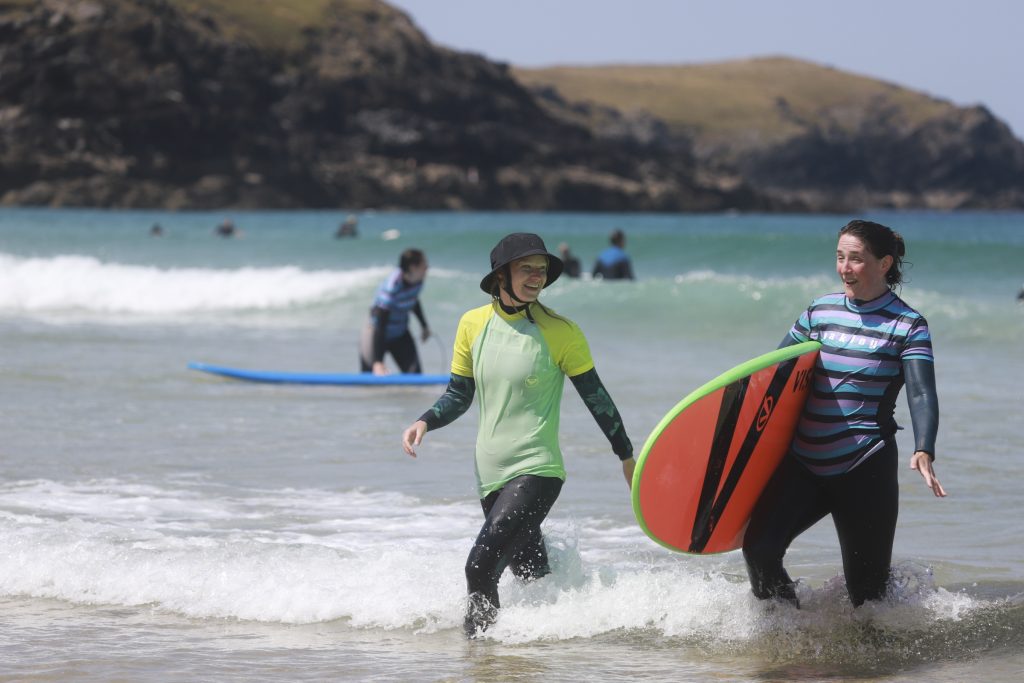
We’re lucky to have Kirsty as part of our team of coaches in Cornwall this summer. If you’re looking for a surf course this summer check out our range of courses here!
